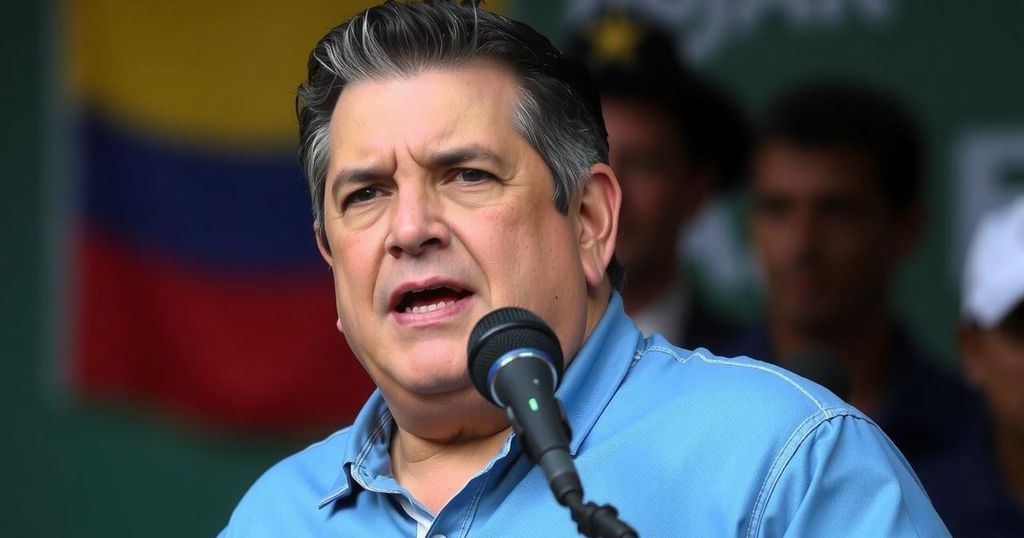Colombia has offered to manage Argentina’s embassy in Caracas, providing refuge for six aides of opposition leader María Corina Machado. Foreign Minister Luis Gilberto Murillo announced ongoing negotiations with Venezuela for safe passage contingent on reciprocal releases. Increased intimidation from the Venezuelan police highlights the pressures faced by the opposition. The situation reflects Colombia’s rising diplomatic engagement in Venezuela amidst claims of human rights violations and contested electoral legitimacy.
Colombia has proposed to take over the management of Argentina’s embassy in Caracas, where six aides of opposition leader María Corina Machado have been residing under the threat of arrest. Foreign Affairs Minister Luis Gilberto Murillo, addressing the matter during a conference in San Andrés, indicated direct negotiations with the Venezuelan government. Venezuela appears amenable to cooperating, contingent upon Argentina’s release of an unnamed individual associated with the Venezuelan government and Ecuador’s release of its former Vice President Jorge Glas. The ongoing tensions reflect Colombia’s increasing involvement in Venezuela’s political crisis, especially following the contested elections and a crackdown on dissenters by President Nicolás Maduro’s regime.
Since March, Machado’s aides have sought refuge in the embassy, facing accusations of terrorism from the Venezuelan authorities. The situation escalated when Venezuela’s police forces intensified their intimidation tactics against the embassy underlining the political unrest. Additionally, the aides have documented the oppressive conditions they have endured, such as the cutting off of power and limitations on essential supplies. The United Nations Human Rights Council has condemned such actions as violations of international law, highlighting the urgent need for intervention.
Negotiations surrounding the aides’ safe passage demonstrate the complexities of regional politics, particularly as President Lula da Silva of Brazil continues to contest Maduro’s electoral legitimacy, calling for greater transparency following the elections. Murillo’s diplomatic efforts signify Colombia’s attempt to mediate amidst growing tensions, as both parties maneuver for control ahead of the new presidential term, starting January 10, 2024.
Recent discussions between Brazil and Venezuela aimed to address the deteriorating diplomatic relations, emphasizing the need for cooperation among all parties involved. In contrast, Argentina’s diplomatic strategy reveals its disillusionment with Maduro’s administration, citing the pervasive violation of human rights and fundamental freedoms under his regime.
The political landscape in Venezuela has become increasingly fraught following Nicolás Maduro’s re-election, which has been widely criticized both domestically and internationally. The crackdown on opposition figures, including María Corina Machado and her aides, reflects Maduro’s efforts to suppress dissent and consolidate his power amid allegations of electoral fraud. The situation is further complicated by regional diplomatic dynamics, particularly involving Colombia and Argentina, as they navigate a response to the human rights violations reported within Venezuela. The involvement of former Ecuadorian Vice President Jorge Glas, amidst his own detention in a separate political context, highlights the intricate web of political crises across Latin America that are interconnected with the Venezuelan situation.
In conclusion, Colombia’s offer to take custody of the Argentine embassy in Caracas underscores the deepening political crisis in Venezuela and the potential for increased regional collaboration to secure the safety of opposition figures. As negotiations unfold, they not only reveal the complexities inherent in Venezuela’s political landscape but also illustrate the significant implications for diplomatic relations across South America. The alignment of Colombia and Argentina’s interests in protecting human rights amidst Maduro’s regime presents a crucial opportunity for regional intervention.
Original Source: www.bnnbloomberg.ca






